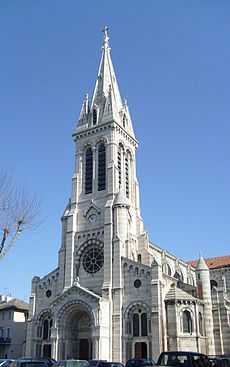Roman Catholic Diocese of Gap
| Diocese of Gap-Embrun Dioecesis Vapincensis-Ebrodunensis Diocèse de Gap-Embrun | |
|---|---|
|
| |
| Location | |
| Country | France |
| Ecclesiastical province | Marseille |
| Metropolitan | Archdiocese of Marseille |
| Statistics | |
| Area | 5,653 km2 (2,183 sq mi) |
| Population - Total - Catholics |
(as of 2006) 126,800 114,000 (89.9%) |
| Information | |
| Denomination | Roman Catholic |
| Rite | Roman Rite |
| Established | 5th Century |
| Cathedral | Cathedral of Notre-Dame and Saint Arnoux in Gap |
| Current leadership | |
| Pope | Francis |
| Bishop | Jean-Michel di Falco Léandri |
| Metropolitan Archbishop | Georges Pontier |
| Website | |
| Website of the Diocese | |
The Roman Catholic Diocese of Gap, is a diocese of the Latin Rite of the Roman Catholic Church in France. The episcopal see is Gap Cathedral, in the city of Gap, in the department of Hautes Alpes. The diocese is suffragan to the archdiocese of Marseille.
The current titular is Jean-Michel di Falco.[1]
History
Ancient traditions in liturgical books, of which at least one dates from the fourteenth century, state that the first Bishop of Gap was St. Demetrius, disciple of the Apostles and martyrs. Victor de Buck in the Acta Sanctorum (October, XI) finds nothing inadmissible in these traditions, while Canon Albanès defends them against M. Roman. Albanès names as bishops of Gap the martyr St. Tigris (fourth century), then St. Remedius (394-419), whom Louis Duchesne makes a Bishop of Antibes and who was involved in the struggle between Pope Zosimus and Bishop Proculus of Marseilles, finally St. Constantinus, about 439. According to Duchesne the first historically known bishop is Constantinus, present at the Council of Epaone in 517. The church of Gap had, among other bishops, St. Aregius (or St. Arey, 579-610?), who established at Gap a celebrated literary school and was held in great esteem by St. Gregory the Great; also St. Arnoude (1065–1078), a monk of Trinité de Vendôme, named bishop by pope Alexander II to replace the simoniac Ripert, and who became the patron of the episcopal city.
Suppressed by the Concordat of 1801 and then united to the diocese of Digne, this diocese was re-established in 1822 comprising, besides the ancient diocese of Gap, a large part of the ancient archdiocese of Embrun.[2] The name of this last metropolitan see, however, had been absorbed in the title of the Archbishop of Aix until 2007. In 2008, the title was reattached to the diocese of Gap by the pope.[3]
Bishops
To 1000
- Saint Démèter (end of 1st century)
- Saint Tigride (4th century)
- Saint Remède (394-419)
- Saint Constantin (439)
- Constance (517-529)
- Vellesius (541-554)
- Sagittaire (560?-578)
- Saint Arey (579-610?)
- Valaton (610?-614)
- Potentissime (650?)
- Symphorien (700?)
- Donadieu (788)
- Biraco (879-879)
- Castus (950)
- Hugues I (971-1010?)
1000 to 1300
- Féraud de Domene (1010-1040)
- Rodolphe (1044-1050)
- Ripert (1053-1060)
- Saint Arnoux (1065-1078?)
- Laugier I (1079-1081)
- Odilon (1085?)
- Isoard (1090?-1105)
- Laugier II (1106-1122)
- Pierre Grafinel (1122-1130)
- Guillaume I (1131-1149)
- Raimond (1150-1156)
- Grégoire (1157-1180)
- Guillaume II (1180-1188)
- Frédéric (1198-1199)
- Guillaume de Gières (1199-1211)
- Hugues II (1215-1217)
- Guigues (1217-1219)
- Guillaume d'Esclapon (1219-1235), abbé de Lérins
- Robert (1235-1251)
- Othon de Grasse (1251-1281)
- Raimond de Mévouillon (1282-1289)
- Geofroi de Lincel (1289-1315)
1300 to 1500
- Olivier de Laye (1315-1316)
- Bertrand de Lincel (1316-1318), nephew of Geofroi
- Guillaume d'Étienne (1318-1328)
- Dragonnet de Montauban (1328-1349)
- Henri de Poitiers (1349-1353)
- Gilbert de Mendegaches (1353-1357), also bishop of Saint-Pons-de-Thomières
- Jacques de Deaux (1357-1362), also bishop of Montauban, bishop of Nîmes, nephew of Bertrand de Deaux
- Guillaume Fournier (1362-1366)
- Jacques Artaud (1366-1399)
- Raimond de Bar (1399-1404)
- Jean des Saints (1404-1409), then Bishop of Meaux
- Antoine Juvénis (1409-1411?)
- Alexis de Siregno (1409-1411)
- Laugier Sapor (1411-1429)
- Guillaume de Forestier (1429-1442), previously bishop of Maguelonne
- Gaucher de Forcalquier (1442-1484)
- Gabriel de Sclafanatis (1484-1526)
1500 to 1800
- Gabriel de Clermont (1526-1571)
- Pierre Paparin (1572-1600)
- Charles-Salomon du Serre (1600-1637)
- Arthur de Lionne (1639-1662)
- Pierre Marion (1662-1675)
- Guillaume de Meschatin (1677-1679)
- Victor de Méliand (1680-1692)
- Charles-Béningne Hervé (1692-1705)
- François de Malissoles (1706-1738)
- Claude de Cabane (1739-1741)
- Jacques de Condorcet (1741-1754), uncle of Nicolas de Condorcet and nephew of Jean d'Yse de Saléon, bishop of Agen and bishop of Rodez then archbishop of Vienne
- Pierre-Annet de Pérouse (1754-1763, nephew of François de Malissoles
- François de Narbonne-Lara (1764-1774)
- François de Jouffroy (1774-1777)
- Jean-Baptiste de Maillé (1778-1784)
- François de Vareille (1784-1801)
- Constitutional bishops:
- Ignace de Cazeneuve
- André Garnier
- Nominated
- TousSaint-Alphonse-Marie de Sinéty
- Louis de Villeneuve-Bargemont
From 1800
- François-Antoine Arbaud 1823-1836
- Nicolas-Augustin de la Croix D`Azolette 1837-1840
- Louis Rossat 1841-1844
- Jean-Irénée Depéry 1844-1861
- Victor-Félix Bernadou 1862-1867
- Aimé-Victor-François Guilbert 1867-1879
- Jean-Baptiste Jacquenet 1881-1884
- L.-Jo.-J.-Bapt.-Léon Gouzot 1884-1887, translated to Auch in 1887
- Jean-Alphonse Blanchet 1887-1888
- Prosper Amable Berthet 1889-1914
- Gabriel-Roch de Llobet 1915-1925, translated to Avignon as coadjutor in 1925.
- Jules-Géraud Saliège 1925-1928, translated to Toulouse in 1928
- Camille Pic 1928-1932, translated to Valence in 1932
- Auguste-Callixte-Jean Bonnabel 1932-1961, retired in 1961
- Georges Jacquot 1961-1966, translated to Marseille in 1966
- Robert-Joseph Coffy 1967-1974, translated to Albi in 1974
- Pierre-Bertrand Chagué 1975-1980
- Raymond-Gaston-Jo. Séguy 1981-1987, translated to Autun in 1987
- Georges Lagrange 1988-2003, resigned in 2003
- Jean-Michel di Falco 2003–present
